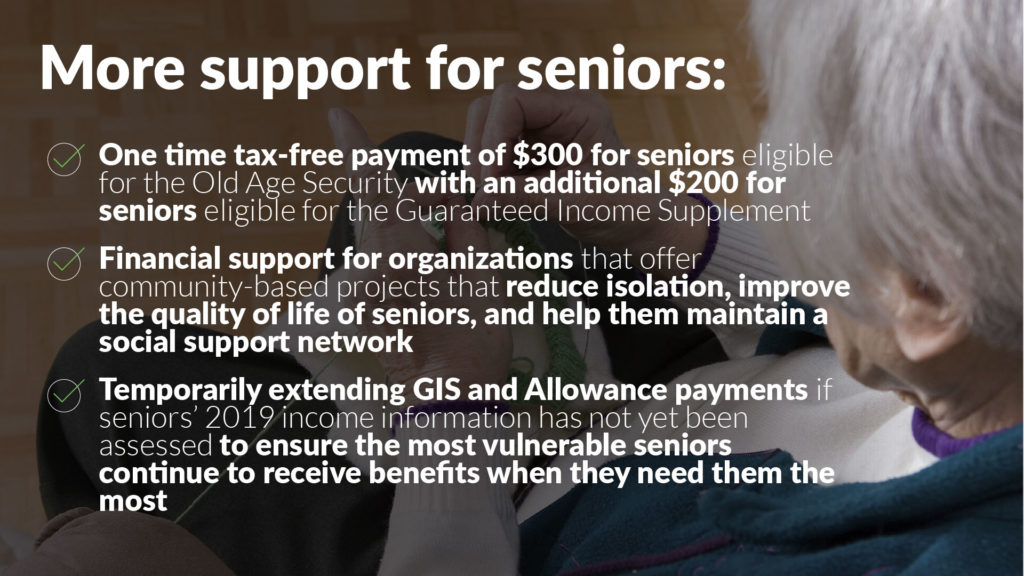

I have been hearing from many seniors who are severely impacted by COVID-19. Many are unable to leave their homes out of fear of compromising their health.
They have been isolated from their friends and family, and are sometimes incurring extra costs related to COVID-19.
The Government of Canada just announced further support for seniors today, to help them face challenges related to COVID-19. Supports include:
- A one-time, tax-free payment of $300 for seniors on Old Age Security (OAS) and $200 for seniors on Guaranteed Income Supplement (GIS). This amounts to a total of $500 to seniors eligible for both OAS & GIS
- A temporary extension of the GIS income tax reporting deadline to Oct. 31st, so that seniors who cannot do their taxes during this time will continue to receive GIS payments
- A $20 million expansion of the New Horizons for Seniors Program, that provides funding to organizations to offer community-based projects that would reduce isolation, improve quality of life, and helping them access & maintain a social support network
OAS Increase
- While the government remains committed to implementing the policies in our platform, at this time we are focused on managing the COVID-19 public health crisis.
- Through OAS, GIS and GST Credit one-time payments, we are providing financial support to seniors of all ages sooner and greater support for the most vulnerable.
- This year we are investing over twice as much on financial assistance for seniors as we committed to in our platform. ($3.8 billion compared to $1.56 billion.)
- We continue to look at all the ideas that are coming in on how we could better help seniors. However, our immediate focus is on helping them with additional costs during the pandemic.
- These payments have provided greater support for the most vulnerable seniors of all ages ($500 for OAS/GIS plus an average $375 per adult and $510 per couple from the GST Credit = $875 per adult or $1510 per couple)
- These payments provide comparable support to middle income seniors ($300 for OAS plus an average $375 per adult senior and $510 per couple from the GST Credit = $675 for singles and $1110 per couple)
Payment Date and Application
- No legislation is required. We will deliver these payments automatically as soon as possible, within weeks. Beneficiaries do not need to apply. Further details will be available soon.
- The one time tax-free payment will be a separate payment.
- For more, see https://www.canada.ca/en/services/benefits/publicpensions/notice-covid-19/one-time-payment.html.
Seniors’ Cost of Living During COVID-19
- COVID-19 has made life more expensive and more difficult for seniors because of the risks of more severe outcomes. Many are facing higher costs for food and services due to imposed restrictions. They’re paying more in dispensing fees to get the same medication. They are paying a premium for deliveries. All the while, their life savings have taken a beating.
RRSP Withholding Taxes & RRIF Minimum Withdrawal Requirements
- We are providing direct financial support to give the most useful help to the most seniors. Early in the pandemic we reduced the minimum RRIF withdrawal by 25%. We are continuing to monitor this volatile market.
OAS Eligibility
- The Old Age Security (OAS) pension is paid to all persons aged 65 or over who meet the residence requirements.
Deferral of OAS and Eligibility for Benefits
- The Old Age Security (OAS) pension is paid to all persons aged 65 or over who meet the residence requirements. When an individual wishes to defer receipt of their OAS pension in exchange for a higher monthly amount, they delay their benefit application until they wish to begin their payments. This means that these individuals are not yet eligible to receive the pension, and will therefore not be eligible to receive this one-time tax-free payment.
Cut-off to Qualify for the OAS/GIS One-Time Payments
- The one-time payment is for those who are eligible for the Old Age Security pension, the Guaranteed Income Supplement or the Allowances in June 2020. This means OAS pensioners would have to be age 65 by May 31, 2020. If an individual subsequently becomes entitled to the Old Age Security, the Guaranteed Income Supplement or the Allowances retroactively to June 2020 or an earlier date, they will receive the one-time payment for seniors after being assessed as eligible.
Eligibility for GIS after OAS/GIS One-Time Payment
- It will not affect eligibility for GIS.
Seniors Subject to OAS Clawback and Eligibility for OAS/GIS One-Time Payment
- All seniors eligible for OAS will receive the full amount with no recovery or withholds. This means that seniors subject to the OAS Recovery Tax will receive the entire $300 payment.
- The number of seniors in this situation is relatively small. Approximately 7% of OAS pensioners are subject to the OAS Recovery Tax, and only 2% have income high enough to have their pensions fully recovered.
- It is important to note that the large majority of OAS pensioners (nearly 85%) have after-tax income below $50K, so this payment will largely benefit seniors with low or modest incomes.
- As Canadian seniors are facing significant health, economic, and social challenges due to COVID-19, the decision was made to issue a simple, one-time payment to assist seniors swiftly. This approach meant no application for seniors, no changes to the IT system required to calculate payments and provided a timely response.
- Anyone who feels they do not require their payment is encouraged to donate it to their local food bank, or charity.
Length of time for Support
- We acted swiftly to address seniors needs during the pandemic. In March we announced a GST Credit for 4 million seniors, a reduction in RRIF mandatory withdrawals and funding for seniors’ supports through the United Way. In May we announced a one-time payment to 6.7 million seniors eligible for OAS/GIS.
Lump-Sum Payment vs. Increase to OAS and GIS Monthly Payments
- Seniors need help now. We are providing one large sum right away instead of small amounts spread out over months.
Collaboration with Opposition Parties
- The government listened carefully to feedback from all Parliamentarians, stakeholders, experts and, most importantly, Canadians seniors themselves.
Canada Emergency Response Benefit (CERB), Canada Emergency Student Benefit (CESB), and Support for Seniors
- The CERB and CESB are intended to replace income that is lost for those who cannot work. While seniors continue to receive monthly income from their pensions, we are providing seniors additional help through the supplementary OAS, GIS and GST Credit payments.
Long-term care
Federal Government Support for Long-Term Care Homes
- While long-term care is regulated by provincial and territorial governments, the federal government is working together with Provinces and Territories to help keep residents and staff safe.
- We released Interim Guidance for Long-Term Care Homes to prevent and control COVID-19 infections.
- We are investing $2 billion to purchase personal protective equipment (PPE) for health workers, including long-term care workers. (See updates here)
- We are providing $3 billion to provinces and territories to increase the wages of low-income essential workers, such as long-term care workers.
- Personnel from the Canadian Armed Forces have been deployed to 25 long-term care facilities in Quebec and to 5 long-term care facilities in Ontario.
- The federal government will continue to work in collaboration with provinces and territories to address pressing needs in long-term care facilities.
Inquiry into Long-Term Care
- COVID-19 has exposed some uncomfortable truths about our society, including how we care for seniors in Canada. We’ve seen heart-breaking tragedies in long-term care facilities and nursing homes right across the country — over-worked staff, under-staffed residences, grieving families — there are serious underlying challenges facing these facilities, and in the coming months the federal government will be there to help the provinces and territories find lasting solutions.
Bringing Family Home from Long-Term Care Homes
- Family members are typically in long-term care because they need special supports—care that may not be possible at home. By providing help with everyday activities for those who need it, long-term care plays a vital role in our communities. Families must make their own decisions about what is best for their circumstances.
Lastly, I want you to know that my team and I are here to help you in any way we can. While our offices are closed, we can be reached as listed below.
This emergency situation is rapidly evolving, for the latest information on COVID-19 please go to www.canada.ca/coronavirus
Best wishes,
Hon. Hedy Fry, P.C.
Member of Parliament for Vancouver Centre



